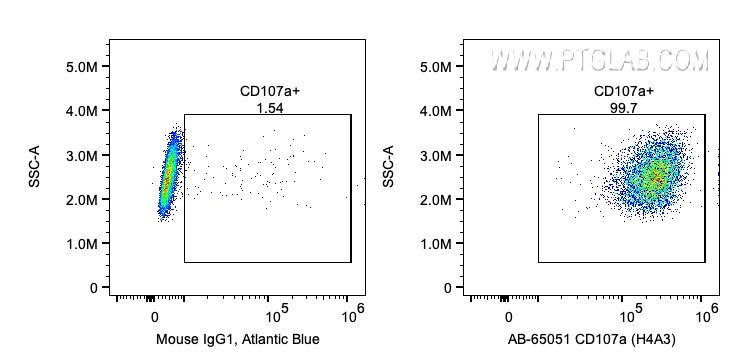Validation Data Gallery
Tested Applications
| Positive FC (Intra) detected in | HeLa cells |
Recommended dilution
| Application | Dilution |
|---|---|
| Flow Cytometry (FC) (INTRA) | FC (INTRA) : 5 ul per 10^6 cells in 100 μl suspension |
| This reagent has been pre-titrated and tested for flow cytometric analysis. The suggested use of this reagent is 5 μl per 10^6 cells in a 100 µl suspension or 5 μl per 100 µl of whole blood. | |
| Sample-dependent, Check data in validation data gallery. | |
Product Information
AB-65051 targets CD107a / LAMP1 in FC (Intra) applications and shows reactivity with Human samples.
| Tested Reactivity | Human |
| Host / Isotype | Mouse / IgG1, kappa |
| Class | Monoclonal |
| Type | Antibody |
| Immunogen |
Human adherent peripheral blood cells 相同性解析による交差性が予測される生物種 |
| Full Name | lysosomal-associated membrane protein 1 |
| Calculated molecular weight | 45 kDa |
| GenBank accession number | BC006345 |
| Gene Symbol | LAMP1 |
| Gene ID (NCBI) | 3916 |
| ENSEMBL Gene ID | ENSG00000185896 |
| RRID | AB_2935154 |
| Conjugate | Atlantic Blue™ Fluorescent Dye |
| Excitation/Emission maxima wavelengths | 404 nm / 458 nm |
| Form | |
| Form | Liquid |
| Purification Method | Protein G purification |
| UNIPROT ID | P11279 |
| Storage Buffer | PBS with 0.09% sodium azide and 0.5% BSA{{ptg:BufferTemp}}7.3 |
| Storage Conditions | Store at 2-8°C. Avoid exposure to light. Stable for one year after shipment. |
Background Information
LAMP1 (CD107a) is a heavily glycosylated membrane protein enriched in the lysosomal membrane. LAMP1 is extensively glycosylated with asparagine-linked oligosaccharides which protect it from intracellular proteolysis (PMID: 10521503). Although LAMP1 is expressed largely in the endosome-lysosomal membrane of cells, it is also found on the plasma membrane (PMID: 16168398). Elevated LAMP1 expression at the cell surface has also been detected during platelet and granulocytic cell activation, as well as in some tumor cells (PMID: 29085473). LAMP1 functions to provide selectins with carbohydrate ligands. This protein has also been shown to be a marker of degranulation on lymphocytes such as CD8+ and NK cells and may also play a role in tumor cell differentiation and metastasis (PMID: 18835598; 29085473; 9426697).

